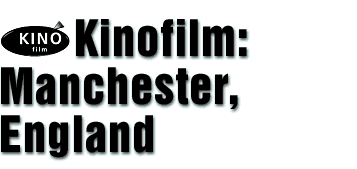|
 |
||
|
Kate Taylor's overview of the thriving Kinofilm, which has become the focus point for filmmakers and audiences living in Manchester |
Manchester has spawned many things. Bar culture, the biggest gay Mardi Gras in Britain, and most of the best guitar and dance music on the planet. Not to mention that football team. The electricity of this city consistently sparks new ideas and inspiration, despite the never-ending rain. Yet this can't seem to change the fact that the current low budget film scene seems, well, drizzly.
Not that film isn't a passion for Mancunians, the UCI at the Trafford Centre keeps breaking British box office receipt records, and a recent survey showed that Manchester students rent the most videos out per capita in the country. But with the majority of technical talent hoovered up by Granada or the BBC, Manchester's output makes it a town of television.
Training too caters for this situation, with courses at Manchester Metropolitan University becoming more documentary based and Salford University producing the majority of programming for a new Manchester-wide terrestrial TV channel. None of the universities or workshops use actual film stock.
Then there's the problem of exhibition. "We're trying to create a film network out there," in steps John Wojowski, director of Kinofilm: "A problem with the colleges is that they don't show work. People don't get to view short films. It's paramount that people get to see as much work from around Britain, and the rest of the world, as possible."
Kinofilm is somewhat of a beacon in the grey skies. Established in 1993 where it started by putting on cult movie festivals at various venues over the city, it currently organises the annual Kino Manchester International Short Film Festival. Marked as something a bit special through John's predilection for the innovative and challenging, it has developed a reputation for showcasing otherwise unseen international work.
With focuses on talent as diverse as new German experimental and Spanish shorts alongside the best of current British work, the highlight of 1999's fest was a day dedicated to Dogme 95. This was a forum event where film-makers brought in copies of their own work produced to the rules, and it was screened and discussed, alongside an English premiere of The Humiliated, a documentary on Lars Von Trier's working methods and the making of The Idiots.
Although the festival is the main fruit of Kinofilm's loins, John is not a man to sit on his hands. Whilst the organisation's structure revolves around the festival, there is a buzzing batch of new projects currently in the pipeline, such as a short film archive, various educational projects, a bus (more of which later) and most ambitiously of all, a fully fledged short film agency.
Plans are currently being hatched to make their huge archive - 90% of films shown since the first Kinofilm festival - accessible to the public. A recent change of premises means Kinofilm now possess a viewing room equipped with Super8, 16mm and 35mm projection equipment. Via an annually subscribed membership scheme, the archive will be available for research purposes or to those who wish to catch up on missed work at the festival.
The archive also proves invaluable to other Kinofilm projects. "At the moment I'm putting a program together for a festival in Serbia and another one in the States, where organisations have approached us with interest in screening a selection of new British low budget experimental shorts," John explains, "Through the archive, we would put a compilation tape together for the festival and send off ideas, almost like us submitting films on behalf of the film-makers. The festival will select maybe an hour's worth of work, they'll come back to us with the final selection, and we will then contact the film-makers involved, tell them their film has been requested and get hold of a Beta tape."
The short film agency would operate along similar lines, focusing on marketing, distribution and exhibition, though John stresses this is still in its initial stages of development. Distinguishing itself from the Short Film Bureau by maintaining Kinofilm's avid links with work that is leftfield and idiosyncratic, it will also be in a unique geographical position. John hopes to strengthen links with MIDA, the North West Arts Board and Northern Arts to provide a focus on work produced in the north of England. "If we target strong films made up here and market them to London that's a strength" John states...
Full article published in Filmwaves - Issue 10, Winter 2000. Subscribe now!
